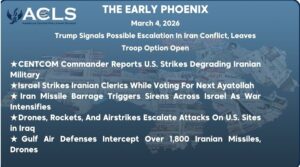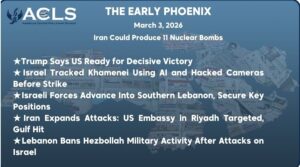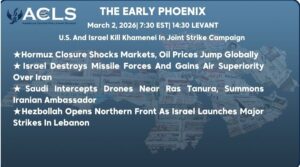TOP HEADLINES:
- Saudi Arabia Extends Voluntary Oil Production Cut
- Israeli High Court Reviews Controversial Law Blocking Removal of Incumbent Prime Minister
- Libya’s Al-Dabiba Firmly Stays in Office, Prioritizing Elections Over Departure
- Arrest Made in Germany of Suspect Tied to Syrian Regime’s Militia for Atrocities
- Jordanian Initiative in Syria Show Limited Progress
TURKIYE
- Türkiye Announces New Chief of General Staff and Key Military Appointments (Yeni Şafak). Türkiye’s Supreme Military Council meeting led by President Recep Tayyip Erdogan resulted in several key decisions, including the appointment of Gen. Metin Gurak as the new chief of General Staff. The meeting also saw changes in top military positions, with Selcuk Bayraktaroglu becoming the new Land Forces commander and Gen. Ziya Cemal Kadioglu taking over as Air Forces commander. Additionally, promotions were approved for 32 generals and admirals, along with 63 colonels moving up to higher ranks. This will raise the total number of generals and admirals in the Turkish Armed Forces from 266 to 286.
- Turkish Coast Guard Rescues 110 Irregular Migrants Pushed into Territorial Waters by Greek Forces (Anadlou Agency). Turkish Coast Guard teams have rescued 110 irregular migrants who were pushed into Turkish territorial waters by Greek forces in the Aegean Sea. The migrants were found on life rafts and inflatable boats off the coasts of various districts in Izmir and Mugla provinces.
ISRAEL AND PALESTINIAN TERRITORIES
- Israeli High Court Holds Hearing on Law Preventing Removal of Sitting Prime Minister (Times of Israel). The Israeli High Court of Justice held a pivotal hearing on Thursday regarding a law passed earlier this year that prevents the court from ordering the removal of a sitting prime minister. The law, passed in March, eliminates the High Court’s option to order a prime minister’s resignation and stipulates that only the government and the Knesset can make such a decision, based on medical grounds and requiring significant support from cabinet ministers and lawmakers.
- Amazon Plans $7.2 Billion Investment in Israel for Cloud Data Center Project (Times of Israel). Amazon Web Services (AWS), the cloud provider under Amazon, has announced its plan to invest $7.2 billion in Israel through 2037 as it launches its cloud-based regional data center project. The AWS Israel region will offer cloud-based services to government ministries, startups, enterprises, and other public entities. The investment will cover both capital and operational expenses for the construction, connection, operation, and maintenance of the AWS Israel (Tel Aviv) data center operations. The project is estimated to add about $13.9 billion to Israel’s gross domestic product (GDP) by 2037 and is expected to create around 7,700 job opportunities annually within local businesses.
EGYPT & NORTH AFRICA
- Libya’s Al-Dabiba Rejects Departure from Office Amid Elections Focus (Ean Libya). He emphasized that the government’s singular focus is on the upcoming elections and that there will be no parallel governments or stages beyond this goal. During a cabinet meeting in Ghadames, Dabaiba urged all those seeking power to allow the people to choose their leaders through the electoral process. He cautioned against provocative political discourse and maneuvers that could hinder the stability and success of the elections. He also expressed concern for neighboring Niger’s security and affirmed support for political legitimacy based on elections, pledging to help maintain the stability of the region.
- UNITAMS Condemns Civilian Targeting in Darfur Conflict, Urges Immediate Halt to Military Operations (Al Arabiya). The United Nations Integrated Transitional Support Mission in Sudan (UNITAMS) has condemned the indiscriminate targeting of civilians and public facilities by the Rapid Support Forces, particularly in the Sirba locality of West Darfur. The mission expressed concern about the impact of the conflict on civilians in the Darfur region, highlighting similar incidents in Nyala, South Darfur, and Zalingei. UN envoy Volker Peretz expressed worries about reports of preventing civilians from escaping to safer areas, resulting in casualties. UNITAMS called for an immediate halt to military operations by all involved forces and urged for a return to talks through the Jeddah platform. The mission reaffirmed its commitment to facilitating a peaceful resolution to the Sudan conflict.
- Egypt’s El-Sisi and Greece’s Mitsotakis Discuss Regional Issues, Emphasize Cooperation and EMGF (English Ahram). Egypt’s President El-Sisi and Greece’s Prime Minister Mitsotakis discussed regional matters, emphasizing the importance of the Eastern Mediterranean Gas Forum (EMGF) for boosting gas trade. They aimed to strengthen bilateral ties, cooperate in various sectors, and address challenges. El-Sisi supported Libya’s political track and sovereignty restoration. The leaders focused on mutual interests and fostering peace and stability. Mitsotakis’s visit followed his re-election and government formation.
The GULF REGION & YEMEN
- Kuwait Ready to Take Measures for Joint Ownership of “Durra” Gas Field, Calls for Negotiations with Saudi Arabia and Iran (Al Sharq Al Awsat). Kuwait expresses readiness to take any necessary steps, including negotiations, to secure joint rights over the submerged “Durra” gas field, disputed with Saudi Arabia. Kuwait’s Deputy Prime Minister and Minister of Oil, Saad Al-Barrak, affirmed that the field belongs to both Kuwait and Saudi Arabia, and both nations have called on Iran to negotiate the boundary of the submerged area. Kuwait and Saudi Arabia had signed an agreement to develop the field. This announcement coincided with the reception of the new Iranian ambassador’s credentials and discussions on Kuwaiti-Iranian relations, including an invitation for the Kuwaiti Foreign Minister to visit Iran.
- Saudi Arabia Extends Voluntary Oil Production Cut to Support Market Stability and Economic Goals (France 24). Saudi Arabia has announced the extension of its voluntary oil production cut of one million barrels per day, which began in July, for another month, including September. The cut is in addition to a voluntary reduction announced in April and will extend until the end of December 2024. This decision comes ahead of a meeting of the Technical Committee of oil exporting countries.
IRAN
- Iranian Foreign Minister Discusses Cooperation and Border Security During Pakistan Visit (Tehran Times). Iranian Foreign Minister Hossein Amir Abdollahian held talks with his Pakistani counterpart, Bilawal Bhutto Zardari, focusing on enhancing border security and fostering cooperation between the two countries. Emphasizing the importance of agreements for border security, Abdollahian highlighted the potential for stronger relations. The meeting aimed to facilitate the implementation of over 190 signed documents and establish a long-term cooperation deal. Bhutto Zardari suggested the formation of a strategic committee to oversee agreements, including in defense and commerce. Additionally, Iran urged Pakistan to complete its part of the delayed gas pipeline project, while also advocating for an end to weapons supplies to Ukraine.
- Iran’s Revolutionary Guard Runs Drill on Disputed Islands as US Military Presence in Region Grows (Associated Press). Iran’s Revolutionary Guard conducted a surprise military drill on disputed islands in the Persian Gulf, including Abu Musa Island. The drill involved small boats, paratroopers, drones, and missile systems. This comes as the US increases its presence in the region due to ship seizures by Tehran. The Pentagon stated the deployment is in response to Iran’s attempts to threaten the free flow of commerce in the Strait of Hormuz.
SYRIA
- German Authorities Arrest Suspect Linked to Syrian Regime’s Militia for Crimes Against Humanity and War Crimes (Dstouria). German police have arrested Ahmed H., a Syrian citizen and former member of the “Shabiha” militia integrated into the “National Defense Forces,” on charges of committing crimes against humanity and war crimes. The arrest comes as part of ongoing efforts to seek justice for Syrian victims of the conflict. The accused is alleged to have participated in the violent suppression of opposition movements in the Tadamon neighborhood of Damascus, where he worked as a local commander. The charges include torture, enslavement, extortion, forced labor, and arbitrary arrests. The arrest warrant was issued by the Federal Public Prosecutor’s Office, and the accused is now in preventive detention.
- Potential Transfer of Chemical and Advanced Weapons to Iranian Axis Proxies (Alma Center). The Scientific Studies and Research Center (CERS) in Syria serves as the country’s national military industry, responsible for developing and producing advanced weapons, including surface-to-surface missiles also involved in producing chemical, biological, and potentially nuclear weapons. CERS is partnered with Iran in various military and technological endeavors, including the “Labaik” project. Additionally, CERS is responsible for Syria’s chemical weapon program, which was used against the Syrian people during the civil war. The threat of Hezbollah using chemical weapons in a confrontation with Israel is a concern.
- Russian and Syrian Regime Forces Conduct Night Tactical Training Exercises in Hama (Syria TV). Russian forces conducted night tactical training exercises in cooperation with Syrian regime units in Hama governorate. The drills simulated scenarios involving enemy control over government positions and the recapture of populated areas with Russian support. The exercises included the use of Su-35 and Su-24 aircraft, Ka-52 attack helicopters, and parachute jumps from Mi-8 helicopters. Russia has conducted joint military exercises with the Syrian regime in the past to showcase its military influence in the region.
- Arab Efforts for Jordanian Initiative in Syria Show Limited Progress (Enab Baladi). Efforts surrounding the “Jordanian initiative” aimed at resolving the Syrian crisis continue, but with little tangible progress. The recent visit of UAE’s President Mohammed bin Zayed to Jordan focused on the Syrian file, reflecting a broader push for Arab engagement in finding a solution. Jordan is leveraging Abu Dhabi’s restored relations with the Syrian regime to advance the initiative, encouraging Damascus to move forward on a step-by-step track. However, experts highlight limited prospects for advancement due to ongoing challenges like drug smuggling, Syrian-Iran connections, political reluctance, and refugee return issues.
IRAQ
- Prospects for Baghdad-Erbil Oil Agreement: Navigating Political Consensus (Sky News). Iraqi Prime Minister Muhammad Shia’ al-Sudani emphasized the importance of achieving clarity in oil policy through a constitutional framework, enabling Iraq to engage in long-term agreements with international companies.
- Kurdistan Region Sets New Date for Parliamentary Elections Amidst Political Challenges (Al Nahar). Kurdistan Region sets February 25, 2024, for parliamentary elections after a year-long postponement due to political disputes. The elections are significant as the Iraqi Federal Court declared the extension of the current parliament’s term unconstitutional.
LEBANON
- World Bank’s Directive Plan Shapes Beirut Port Reconstruction Amid Challenges (Al Sharq Al Awsat). Beirut Port reconstruction stalls despite a World Bank plan. The plan envisions port areas transformed into residential and tourist zones, including space for gas exploration. The process faces funding challenges, investor caution due to instability, and geopolitical complexities. French involvement through agreements and expertise is notable. The reconstruction seeks to balance economic growth, history preservation, and geopolitics.
- Lebanon Warns Palestinian President that Troops May Intervene if Clashes Continue in Refugee Camp (Haaretz). Lebanon’s caretaker prime minister, Najib Mikati, called Palestinian President Mahmoud Abbas to demand an end to the clashes between Palestinian factions in the Ein el-Hilweh refugee camp. Mikati warned that Lebanese troops may intervene if the fighting continues. The camp has witnessed fierce battles between Fatah and Islamist groups, leaving dozens dead and wounded, and displacing thousands.
- At Lebanese Border, Herzog Warns Hezbollah Not to Test IDF (Israel Hayom). President Isaac Herzog visited a military post on the Lebanon border on Wednesday, delivering a stern message to Hezbollah amid increased provocations by the Iran-backed terror group. “Let no one among our enemies be mistaken – especially Hezbollah across the border. The IDF is very strong, organized and ready for any scenario,” Herzog posted to the X social-media platform, formerly known as Twitter.
| Country | Exchange Rate |
| Egypt | 1 US Dollar = 30 EGP |
| Iran | 1 US Dollar = 50,250 IRR |
| Lebanon | 1 US Dollar = 91,000 LBP |
| Syria | 1 US Dollar = 11,800 SYP |
| Türkiye | 1 US Dollar = 26.9 TL |



